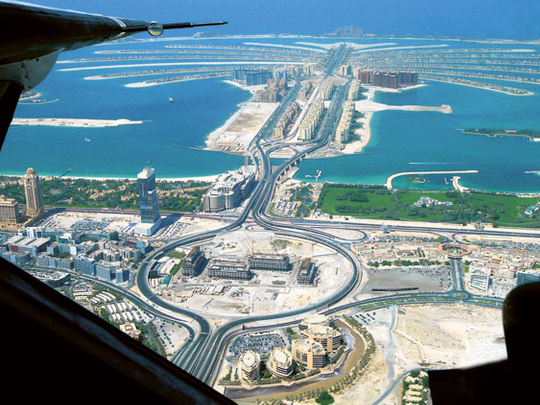
Dubai: A dramatic fall in yields on the bonds of state-owned property developer Nakheel underlines how investor sentiment towards Dubai is improving, even though the outlook for the company's own business remains tough.
Nakheel's $1 billion (Dh3.67 billion), five-year sukuk is yielding about 14 per cent, down from levels above 21 per cent when the Islamic bond was issued to trade creditors last August as part of a restructuring of the company's $16 billion debt.
The drop suggests international investors are increasingly looking beyond the crisis at the emirate's efforts to grow as a trade, tourism and financial services hub.
Perception improves
"The improvement in the perception of Dubai is certainly a key factor" in Nakheel's bond rally, Biswajit Dasgupta, head of trading at Abu Dhabi investment firm Invest AD said.
"There is an overall sense that the emirate is on the right track and is doing what it needs to do to resolve the problem. The on-the-ground evidence in the form of tourism and hospitality numbers, real estate...is also helpful."
Nakheel was brought under direct government control last August as part of the restructuring of its parent Dubai World.
A second, $65 million tranche of Nakheel's sukuk will probably be issued to trade creditors by the end of April, its chairman said this week. The tranche will be about a quarter of the size previously expected after the firm persuaded creditors to accept a big discount on their claims.
Although there are some signs that Nakheel's business is reviving — it launched a residential project on its Palm Jumeirah site this year — it still faces difficult business conditions and a multi-year process of paying down debt.
Nakheel said in Dec-ember that it made a net profit of $143 million in the first half of 2011; it did not give a year-earlier comparison. Revenue for the period was Dh1.5 billion, mainly from the handover of properties in a number of its projects.
"It's fair to say that they are not the worst of the bunch anymore. But they are not the best," Loic Pelichet, assistant vice president for research at NBK Capital, said.
"We know Nakheel restored some of its projects and are in a better position now. But Nakheel is still in the news with some problems."
Dubai property prices plunged 50 per cent or more during the crash; while recent months have seen signs of strength in some areas, such as rents for high-end villas, the residential market as a whole is still plagued by oversupply so a strong rebound of the market looks unlikely in the foreseeable future.
Residential oversupply
Dubai's real estate watchdog estimates as many as 16,000 new homes will hit the market this year, adding to an estimated 10,700 that were introduced last year.
A Reuters poll of analysts in January suggested the emirate's residential property sector was oversupplied by about 30 per cent.
Another concern for investors is that although Nakheel is now state-owned, and might be able to request government support in the event of another crisis, its sukuk is guaranteed by the company's assets and not directly by the government.
Dubai's five-year sovereign credit default swaps (CDS), used to insure against any debt default by the government, have narrowed to 349 basis points from around 445 at the start of this year and levels above 600 in early 2010.
That is despite an increase in geopolitical tensions in the Gulf because of Iran's disputed nuclear programme. CDS for Abu Dhabi have narrowed much more slowly this year to 116 bps from 125 bps.












